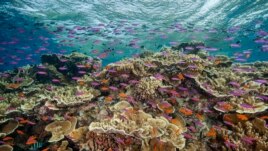05 March 2022
The United Nations Intergovernmental Panel on Climate Change (IPCC) is warning that the life of the Great Barrier Reef is in serious danger.
The IPCC released its sixth major report on the health of the planet Monday. It said if Pacific Ocean temperatures continue to rise, bleaching will kill the remaining corals that make up Australia's Great Barrier Reef.
Bleaching is the result of higher-than-normal ocean temperatures. Warmer water causes corals to release the plants that feed them and make them colorful. They turn white and sicken, often dying very quickly.

The U.N.'s recent report on climate change says the Great Barrier Reef in Australia is in great danger.
The report predicts the warming will continue and bleaching events will happen more often.
The Great Barrier Reef is the largest living structure on Earth. The reef is over 2,300 kilometers long. It is home to thousands of kinds of fish and other animals. Giant clams, whales, dolphins and birds are among the others that depend on the reef to live.
Humanity also profits from the reef. It is a very popular with visitors, who bring a lot of money to the area. Before the start of the COVID-19 crisis, reef tourism was worth $4.6 billion yearly to the Australian economy. The industry also supported over 60,000 jobs.
The reef was the center of Tony Fontes' 40 year career. The professional diver taught the sport and led dive trips to the reef.
Fontes said he has seen the reef after a bleaching event. He described the water turning white from the floating remains of dead corals. He compared the destruction to that from a forest fire.
"You just realize you've just swum across a reef that a couple weeks ago was full of life and vibrant and now a bushfire has gone through it and the coral is dead, he said, adding, "and the rest of the marine life will just have to move on or die off."
Ava Shearer also got a close look at a bleaching when she swam at the reef two years ago. The sight made her cry.
The reef used to look like a busy capital city, she said, but that day, it was empty.
The now 17-year old Shearer is a sea life student at nearby James Cook University. She is worried about the reef's future.
"I fear there might not be anything for me to study," she said.
In 2016, the Great Barrier Reef had its worst bleaching on record. Over 90 percent of the reef was sickened. The IPCC says the northern and middle parts of the reef were hit hard by a series of bleachings that followed. The report described the reef there to be in a "highly degraded state."
That bleaching will continue along the reef is almost certain, the IPCC says in the report. In fact, the report suggests it may simply be too late to stop bleaching completely. Even if the world is able to meet an international goal on temperature reduction, bleaching events will still take place, the IPCC found.
The IPCC says warming ocean water will hurt reefs around the world and reports that there have been mass deaths of some coral species.
It will not be easy for Australia to reduce its effect on the world environment, however. The nation's economy depends on exports of coal and natural gas. It also burns coal for power.
Even with warnings about the state of the reef and its economic importance, the nation has not been moving fast on such issues. Climate action is a difficult subject in Australia, one of the world's biggest exporters of coal and natural gas.
The Australian government said recently it would provide $1 billion to help the reef. Critics said that alone will not keep ocean temperatures from going up.
The IPCC report noted that if the bleaching continues, Australia's economy will lose almost $1 billion and 10,000 jobs per year from reduced tourism.
Scott Heron is a physics professor and a reef science expert at James Cook. He said 1 billion people in the world depend on healthy reefs to make a living. If the world does not work to slow climate change there could be serious problems for humans, he said.
"It's going to affect real people and real people's lives," he said.
Climate change, the report said, will hurt more than just the reef in Australia. The IPCC predicts deadly wildfires will also increase in number and severity.
IPCC panelist Mark Howden is director of the climate school at Australian National University. He said conditions that scientists predicted for the future are "appearing pretty much now."
However, Howden said Australians should focus on the solutions to the problems and not lose hope. He said the report offers ideas that can reduce pressure on the reef and help Australia reduce its negative impact on the environment.
He said Australians should be concerned about all the problems discussed in the report. But, he said the IPCC also wrote about ways to prevent "worst-case scenarios in the future."
I'm Caty Weaver. And I'm Dan Friedell.
Dan Friedell adapted this story for Learning English based a report by The Associated Press.
Do you think Australia will be able to help the reef with more than just money? Write to us in the Comments Section and visit 51VOA.COM.
Words in This Story
vibrant– n. bright, colorful and full of life
bush fire– n. a fire in an undeveloped area that has not been used for farming
degrade – v. to break down
species– n. a group of animals or plants that are similar
focus– n. a subject that is being discussed or given attention
negative– adj. harmful or bad
stress - n. tension and worry or a bad effect
scenario - n. a description of what could happen